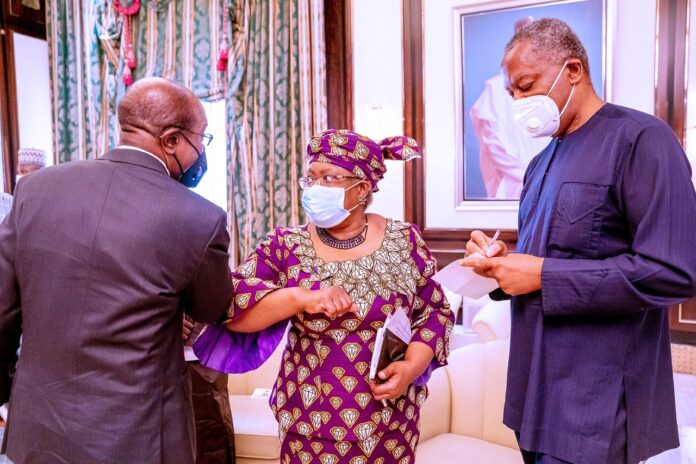Tanko Mohammed
The World Trade Organisation (WTO), says it will work to deliver directly technical assistance, training and quality upgrade to unlock some bottlenecks confronting Nigeria.
Dr Ngozi Okonjo-Iweala, Director-General of WTO stated this on Monday in Abuja when she paid courtesy visit to Otunba Adeniyi Adebayo, Minister of Industry, Trade and Investment and Minister of State, Amb. Mariam Katagum.
She described WTO as an economic institution which could work with other financial institutions to support investments and technical assistance to mitigate Nigeria’s economic challenges.
She said the WTO was created with World Bank and International Monetary Fund (IMF), adding that these three institutions, by working together, could deliver a lot.
Okonjo-Iweala also noted that Nigeria’s share in world trade was 0.33 per cent which showed a small fraction of what Nigeria could do.
“Our share in Africa’s trade is 19 per cent, which is below our share of Africa’s Gross Domestic Product (GDP). This means we can turn it around.
“I like to look at the optimistic side, when I saw this I knew that there was potential for us to do much. And that is the message I want to convey to the country.
“This means that we must step up our action on the economy, we must do better and harder in several ways because of our youth who are waiting for jobs.
“Nigeria needs to focus on adding value on transitioning. We are an oil and gas-based economy; and that has sustained us and still will. But the world is moving away from fossil fuel,” she said.
Okonjo-Iweala said trade negotiations on agricultural issues were very important for Nigeria adding that the country was active in agriculture and also in the Joint Statement Initiatives, ongoing prolateral negotiations.
According to her, Nigeria is equally involved in E-commerce, services domestic regulations, investment facilitation, micro small and medium enterprises and women in trade.
Okonjo-Iweala, while stating that Nigeria was 103 out of 167 countries in logistics, advised that it was a potential area Nigeria could invest in to improve its logistics.
She said the country can take advantage of trade within the Africa Continental Free Trade Area (AfCFTA).
The WTO D-G also noted that WTO was being faced with many challenges and also needs its own reforms to deliver results.
She added that the organisation has not delivered a multilateral round of negotiations in quite a number of years and has the unique opportunity of delivering the fishery subsidy negotiations.
Okonjo-Iweala explained that supporting and finishing the fishery subsidy negotiations was important for the sustainability of our oceans.
Speaking on COVID-19, Okonjo-Iweala said the WTO must contribute more to the solutions of vaccines therapeutics and diagnostics, especially to the poor countries.
On its dispute settlement system that was paralysed, she said it had to discuss with all members including the U.S. on how to make it work again.
She said this was because the rules-based organisation could not continue to make rules if the dispute settlement system did not work.
“Our vision for the WTO is to face these challenges. I hope that Nigeria will take a very active supportive role in helping me to deliver on some of the messages,” she added.
Earlier, Adebayo intimated Okonjo-Iweala on some of Ministry’s expectations regarding its engagement in ongoing negotiations as it prepared for the WTO Ministerial Conference, scheduled to hold in Geneva in December 2021.
On the ongoing agriculture negotiations, Adebayo said Nigeria was expecting balanced and equitable outcomes that would address the structural causes of insecurity in Net Food Importing Developing Countries (NFIDCs) and Least Developed Countries (LDCs).
On the fisheries subsidies negotiations, the minister noted that the ministry looked forward to outcomes that would result in reduction of overfishing and unsustainable development of the fishing sector of developing countries.
“I also wish to draw your attention to our capacity difficulties which continue to undermine our effective participation in the multilateral trading system.
“While we acknowledge with thanks the capacity-building efforts of WTO around training officers on international trade governance, the need for more targeted technical assistance from the WTO cannot be overemphasised,” he said.
Adebayo appreciated President Muhammadu Buhari for according priority for Nigeria’s participation in the D-G WTO selection process and authorising the deployment of political, diplomatic and other resources.
He said this was to ensure Okonjo-Iweala’s emergence from the three rounds of consultation as the candidate with the largest support of members to lead the WTO and your subsequent confirmation as D-G by WTO.
Similarly, Katagum urged the D-G WTO not to forget the commitment to sustain and enhance the ongoing dialogue and action on ‘women in trade’, as a firm believer in the power of trade to lift developing countries, including Nigeria out of poverty.




